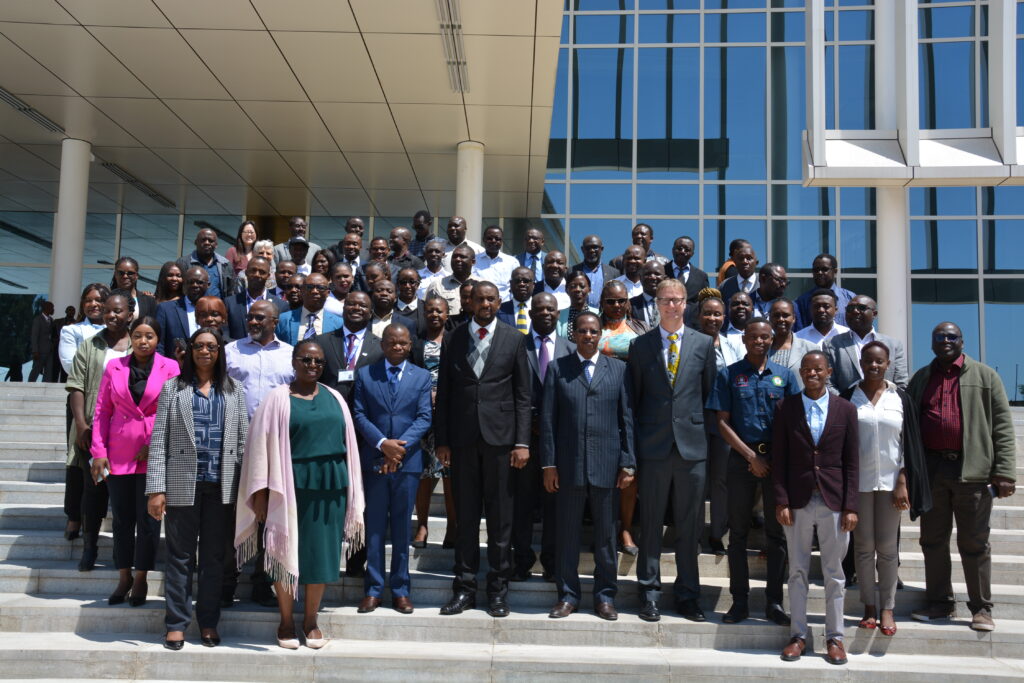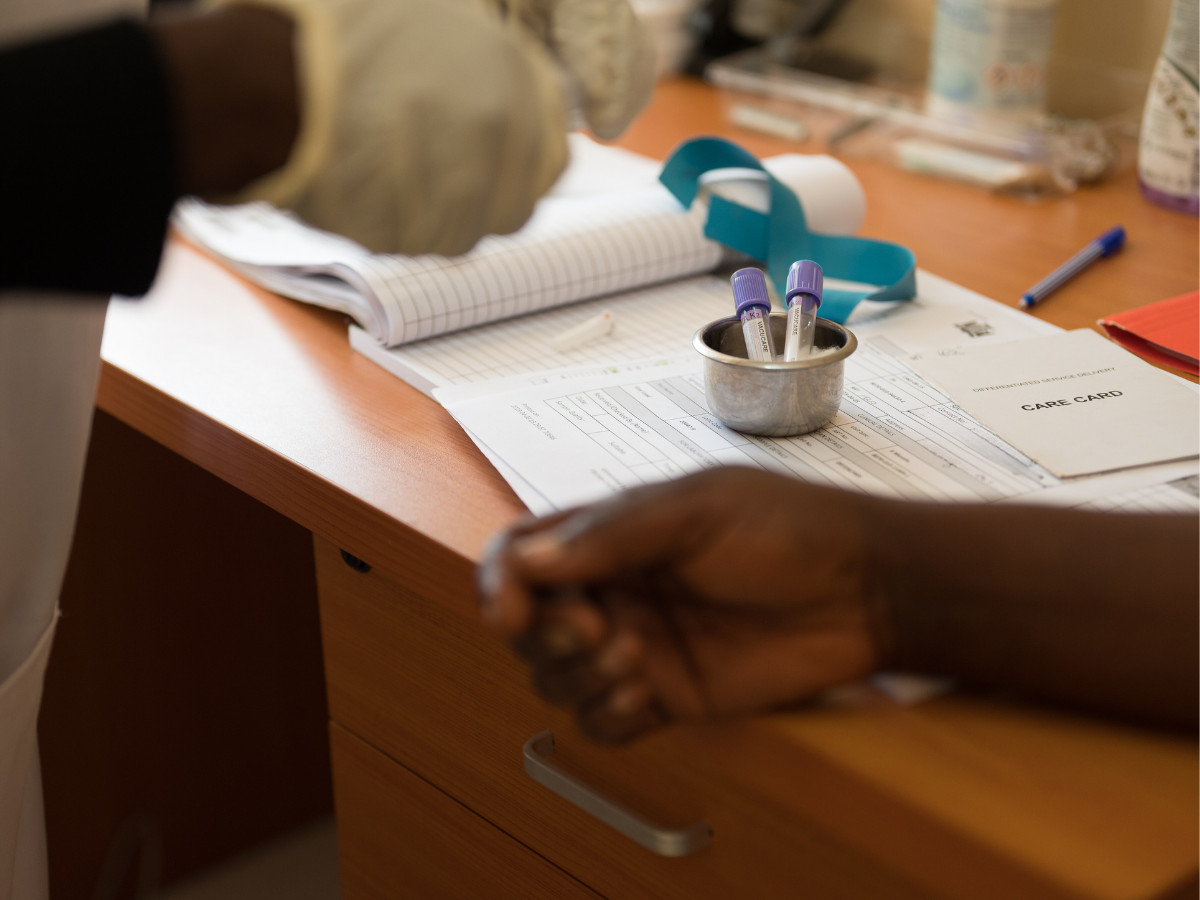ICAP in Zambia supported the first biobehavioral survey among female sex workers and commercially and sexually exploited girls (CSEG) in the country, with preliminary results suggesting HIV prevention services are necessary for addressing extremely high HIV prevalence among the two populations.
The Zambia biobehavioral survey of female sex workers and CSEG was conducted by ICAP in collaboration with the Zambia National HIV/AIDS/STI/TB Council (NAC) and the Tropical Diseases Research Centre (TDRC) with funding from the U.S. President’s Emergency Plan for AIDS Relief (PEPFAR) and technical assistance from U.S. Centers for Disease Control and Prevention (CDC). Biobehavioral surveys involve administration of a population-tailored questionnaire as well as collection and analysis of biological samples to ascertain population-specific prevalence of infectious diseases.
Between March and May 2023 in the towns of Chipata, Kitwe, Lusaka, Mazabuka, Mongu, and Solwezi, the survey estimated Zambia’s progress toward the UNAIDS 95-95-95 HIV targets. Enrolling a total of 2,312 participants, HIV prevalence among female sex workers and CSEG aged 16 years and older ranged from 32.0 percent in Lusaka to 45.4 percent in Mongu. Young participants aged 16-24 years were at substantial risk, with HIV prevalence ranging from 10 to 17 percent across towns. Although most participants who were HIV-negative or unaware of their HIV status had heard of pre-exposure (PrEP), uptake of PrEP was low.
All surveyed towns were shown to have met the second and third UNAIDS 95-95-95 targets, with over 95 percent of female sex workers and CSEG living with HIV aware of their HIV status and on antiretroviral treatment, and among them, over 95 percent with suppressed HIV viral loads. Awareness of HIV status among female sex workers and CSEG living with HIV – the first UNAIDS target – varied across towns. Chipata (94.8 percent), Mongu (93.0 percent), and Mazabuka (91.4 percent) were close to meeting the target; however, Lusaka, Kitwe, and Solwezi had not yet reached the 2020 UNAIDS target of 90 percent, emphasizing the continued importance of increasing knowledge of one’s HIV status.
“The survey illustrates our progress in the HIV response in the community,” said Andrew Auld, CDC country director, “and where we need to strengthen and focus our efforts.’’
“The 2023 biobehavioral survey provides us the first opportunity to measure among female sex workers their progress towards the UNAIDS 95-95-95 testing and treatment targets,” added Tafadzwa Dzinamarira, country director of ICAP in Zambia, “as well as their access and uptake of highly effective HIV prevention methods like oral PrEP. We’ve seen notable advances among the general population of women in Zambia around awareness of HIV status, sustained treatment, and viral suppression. This biobehavioral survey showed us that among the most vulnerable women at high risk of HIV there is progress, but much work to be done to ensure everyone has access to HIV prevention services.”
Final results for the Zambia biobehavioral survey are expected to be released by the close of 2023. Results will inform HIV programming throughout the country, including the development of policies that support key populations in better accessing HIV prevention, care, and treatment services.
Dissemination of the preliminary findings took place in August 2023, with attendance from the Ministry of Health, NAC, TDRC, CDC, USAID, UNAIDS, USG implementing partners, and, importantly, female sex workers who participated in the survey. Leading up to the main dissemination event, ICAP held a series of meetings with female sex workers from the various survey communities to discuss findings, as well as gather insight on improving HIV prevention, care, and treatment services for female sex workers in the country.

Zambia biobehavioral survey dissemination meeting
In group discussions, many female sex workers acknowledged that stigma and fear of lack of confidentiality and privacy at health facilities are barriers to accessing HIV testing and services. Group participants also spoke to misconceptions about HIV, such as some believing taking PrEP could induce HIV. Group recommendations for addressing these obstacles included peer-to-peer support – or enlisting community members to help better coordinate discreet HIV health services – and enhancing sensitization around HIV among general community members. Use of social networking strategies and community support groups were recommended methods for reaching particularly young populations. The groups also discussed challenges they often face, such as escalating violence with clients.
Understanding the challenges female sex workers face – and incorporating their lived experiences – is vital to ICAP’s commitment to engaging community voices in survey implementation as well as developing long-term, sustainable solutions to ending the HIV epidemic.
“It was so uplifting to see that we are cared for, to know that we have people who want to hear our problems and challenges and are interested in finding solutions to these problems,” said a female sex worker from Solwezi who participated in the survey and dissemination discussions. “We are grateful for inviting us and allowing us to share our experiences.”
“You have brought together real people to discuss issues they experience in their daily lives,” said Fortune Chibamba, NAC director of programs, referring to the final dissemination event. “They have shared their stories with policymakers and service providers. My expectation from this is better service provision to the key populations.”
About ICAP
A major global health organization that has been improving public health in countries around the world for two decades, ICAP works to transform the health of populations through innovation, science, and global collaboration. Based at Columbia Mailman School of Public Health, ICAP has projects in more than 40 countries, working side-by-side with ministries of health and local governmental, non-governmental, academic, and community partners to confront some of the world’s greatest health challenges. Through evidence-informed programs, meaningful research, tailored technical assistance, effective training and education programs, and rigorous surveillance to measure and evaluate the impact of public health interventions, ICAP aims to realize a global vision of healthy people, empowered communities, and thriving societies. Online at icap.columbia.edu








